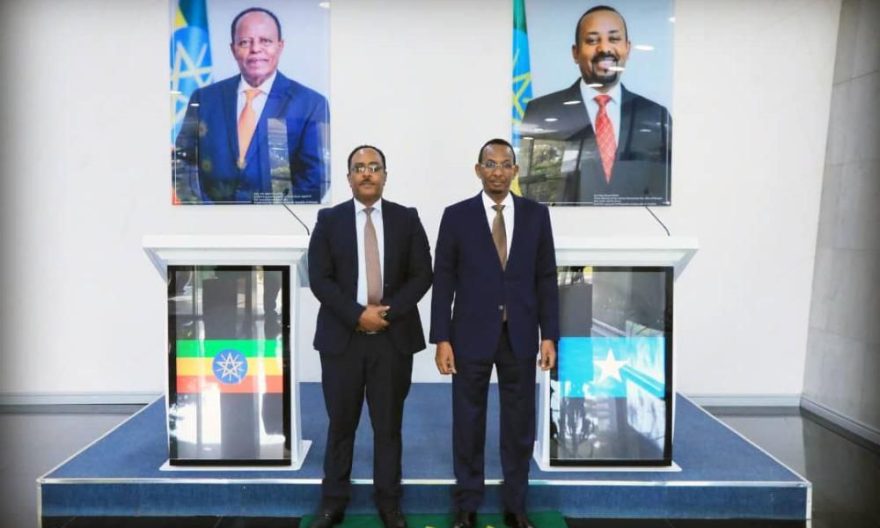
On December 11, 2024, Ethiopia and Somalia signed the historic Ankara Declaration in the Turkish capital, Ankara, under the mediation of Turkey. This agreement marked a pivotal moment in the relationship between the two East African neighbors, fostering collaboration to address mutual challenges, promote economic cooperation, and ensure regional stability. The Horn of Africa has long been a region of geopolitical significance, with Ethiopia and Somalia sharing a complex history. Disputes over territorial integrity, access to the sea, and maritime agreements have fueled tensions between the two countries for decades. Ethiopia’s landlocked status has further intensified its need for reliable and sovereign access to the sea, while Somalia has sought to maintain its territorial sovereignty and address domestic challenges, including the threat of terrorism from Al-Shabaab.
Recognizing the need for sustainable peace and development, Ethiopia and Somalia, with Turkey’s facilitation, engaged in months of negotiations culminating in the signing of the Ankara Declaration. The Declaration recognizes Ethiopia’s need for access to maritime routes for trade and economic growth. Somalia has agreed to facilitate Ethiopia’s access to its ports under mutually beneficial terms while ensuring respect for Somali sovereignty. Ethiopia’s previous agreements with Somaliland, particularly regarding the establishment of a naval base, had strained relations with Somalia, which considers Somaliland part of its territory. The Declaration commits both nations to engage in dialogue to address such disputes, fostering cooperation rather than unilateral actions.
Both nations reaffirmed their commitment to combat shared threats, particularly the menace posed by Al-Shabaab. They agreed to enhance intelligence sharing, joint operations, and capacity-building to curb terrorism in the region. The Declaration promotes increased trade and infrastructure projects, including joint investments in ports, roads, and energy. Somalia’s extensive coastline and Ethiopia’s vast market are seen as complementary assets for regional development. To ensure the effective implementation of the Declaration, a Joint High-Level Committee will oversee initiatives and address challenges in areas such as security, trade, and cultural exchange.
The Ankara Declaration is a landmark agreement with implications far beyond Ethiopia and Somalia. It signals a shift toward diplomacy and collaboration in a region often marked by conflict and external interference. By addressing contentious issues like maritime access and territorial disputes, the Declaration sets a precedent for peaceful negotiations in the Horn of Africa. Additionally, the commitment to joint counter-terrorism efforts strengthens the regional fight against extremist groups, ensuring a safer environment for economic growth and social development. The Declaration has been welcomed by the international community, with organizations such as the United Nations and the African Union praising it as a model for conflict resolution. Turkey’s role as a mediator has also been lauded, reflecting its growing influence in African geopolitics.
While the Ankara Declaration marks significant progress, its success depends on the commitment of both nations to uphold the agreement. Historical mistrust, ongoing security threats, and potential political changes in either country could pose challenges to its implementation. The Ankara Declaration represents a bold step toward a new era of cooperation between Ethiopia and Somalia. By prioritizing dialogue, mutual respect, and shared development goals, the agreement holds the promise of transforming the Horn of Africa into a region of stability and prosperity. As both nations work to implement its provisions, the international community will watch closely, hopeful that this landmark accord will deliver lasting peace and progress.
This week, the security institutions of Ethiopia and Somalia have engaged in discussions to address challenges that hinder the full implementation of the Ankara Agreement. Ambassador Redwan Hussien, Director General of Ethiopia’s National Intelligence and Security Service (NISS), along with key leaders of the institution, held extensive talks with Abdullahi Mohamed Ali, Director of Somalia’s National Intelligence and Security Agency, during an official visit to Addis Ababa.
In a press release issued by NISS to the Ethiopian News Agency, it was revealed that the discussions focused on current affairs and regional issues of mutual concern. Both sides conducted in-depth deliberations on areas of cooperation and partnership essential for realizing the objectives of the Ankara Agreement. The intelligence and security agencies of the two countries reached a consensus on their roles in overcoming obstacles to the agreement’s implementation, emphasizing their longstanding interconnected development and centuries-old unity despite occasional efforts to disrupt their relations.
Recognizing the persistent threat posed by Al-Shabaab to the East African region, Ethiopian and Somali officials reaffirmed their commitment to combating terrorism. They agreed to leverage their previous experiences and develop enhanced mechanisms for cooperation and partnership to address security challenges effectively. The discussions highlighted the importance of collaboration and consultation in tackling shared threats to ensure regional stability and prosperity.
Somalia’s State Minister for Foreign Affairs and International Cooperation, Ali Omar, underscored the continued commitment of both nations to achieving shared development and peace. This reaffirmation came as a Somali delegation, led by State Minister Omar, concluded a working visit to Ethiopia, focusing on bolstering bilateral ties in the context of the Ankara Agreement. During the visit, discussions were held with Ethiopia’s State Minister of Foreign Affairs, Ambassador Misganu Arga, marking the first high-level engagement since the agreement’s signing. Ambassador Misganu reiterated Ethiopia’s steadfast commitment to the Ankara Declaration, while State Minister Omar described the discussions as “fruitful,” highlighting the need to look forward and overcome historical challenges to pave the way for progress.
State Minister Omar emphasized the significant potential for economic cooperation between the two nations, stating that Somalia has the longest coastal area and Ethiopia has the biggest market. Somalia expressed its willingness to provide commercial access to Ethiopia at any moment and in any location they desire. The visit and subsequent discussions have laid the groundwork for translating the Ankara Agreement into concrete actions, fostering stronger bilateral relations and regional development. This collaborative effort represents a significant step toward ensuring peace, stability, and mutual prosperity in the Horn of Africa.
BY STAFF REPORTER
THE ETHIOPIAN HERALD THURSDAY 26 DECEMBER 2024




